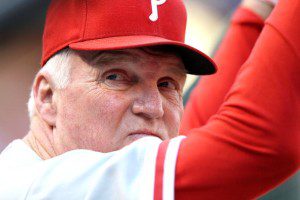
Entering his eighth season with Philadelphia, Charlie Manuel has built an impressive resumé in leading his club to five straight postseasons, capturing two Pennants and winning a World Series in 2008. Brought in as a replacement for Larry Bowa in 2oo5, there is no disputing that Manuel has played a pivotal role in turning the Phillies’ luck around and making them perennial contenders. Having said this, it seems as though Manuel, like Mary Poppins, must realize that his “work here is done,” and that his days in the City of Brotherly Love are numbered.
It may be a bit ludicrous to call for a manager’s head after just 15 games, but the problem facing the Phillies didn’t start in 2012. Even with 102 wins in last year’s regular season, the offense was lacking, and their below-average hitting cost more games than it won. In 2010, the hitting was so poor early on that then-hitting coach Milt Thompson was fired and replaced by Greg Gross. This time, a slumping offense would mean another move, and this time it won’t be Gross packing his bags.
Charlie Manuel was brought in as a “hitting guru.” After playing for over a decade in Japan as a power-hitting outfielder, he came back to the states and managed in the minor leagues until a promotion to the MLB as Cleveland’s hitting coach in 1988. In his two stints (1988-89, 1994-99), the Indians set a franchise record in runs scored (1,009 in 1999), and led the American League in runs and home runs multiple years. Unfortunately, Manuel has not found a way to translate this hitting success over to the Phillies, who are currently second to last in the league in runs per game (2.80), slugging percentage (.320) and below league average in practically every batting category.
The argument can be raised that they aren’t the worst team, but their wins have come mainly on the shoulders of their pitching staff. Allowing the least amount of runs per game and having some of the best starters in the game are positives, but Charlie has little impact on their performance; after all, he’s a “hitting guru,” not a pitching expert. Even with the amazing pitching, a team completely devoid of offense can’t win (see: Cliff Lee‘s 10 inning shutout performance spoiled in a 1-0 loss). No matter how dominant 2011 Cy Young contenders Roy Halladay, Lee and Cole Hamels are, without run support, they literally cannot win.
And it’s not just the offense that Manuel should be taking heat for. There have been multiple times this season that his managing style, which includes who he pulls off the bench and the lineup he sets every day, has been questionable. Last Wednesday, when the Phillies lost 1-0 to the Giants in 11 innings, Manuel put lefty Jim Thome in to pinch-hit against a right-handed pitcher with one out and a man on third. Good move. But when San Francisco countered with a left-handed pitcher, specifically Javier Lopez, Manuel kept Thome in instead of subbing John Mayberry Jr, a right-hander who would have a better chance of hitting a sac fly to tie the game. Thome struck out, Manuel looked like an idiot. Other moves, such as keeping a starter in too long or just sending out a bad starting lineup, are not good enough for a manager looking to keep his job. (check out CharliesManuel.org for game-by-game analysis of Charlie’s managing)
The Phillies also can remove Manuel fairly easily because they have Ryne Sandberg waiting in the wings. The 2011 MiLB Manager of the Year, Sandberg led the Triple-A Lehigh IronPigs to their first ever playoff appearance and Championship Series. When Lou Piniella’s time ran out on Chicago, he suggested Sandberg replace him: Mike Quade won the job instead, but a recommendation from one of the most prolific managers of our time is a great addition to Sandberg’s resumé. Along with recognition from the MiLB and Piniella, many players under Sandberg in 2011 lauded the coach’s ability. In an interview with PhightingOn.com, infielder Kevin Frandsen said that,
“[Sandberg is] one hell of a manager and great guy to go along with it. … I truly think he will be a great manager in the major leagues and obviously feel he is already a great manager in the minors.”
Manuel needs to turn the offense around in Philadelphia. The Phillies are the second highest-paid team in the MLB, and lack of talent is no excuse for a team that has made the playoffs five years in a row. The high-priced team will be looking for someone to blame if its struggles continue, and since you can’t fire a underperforming player who’s making millions per year, Manuel is the logical scapegoat.
